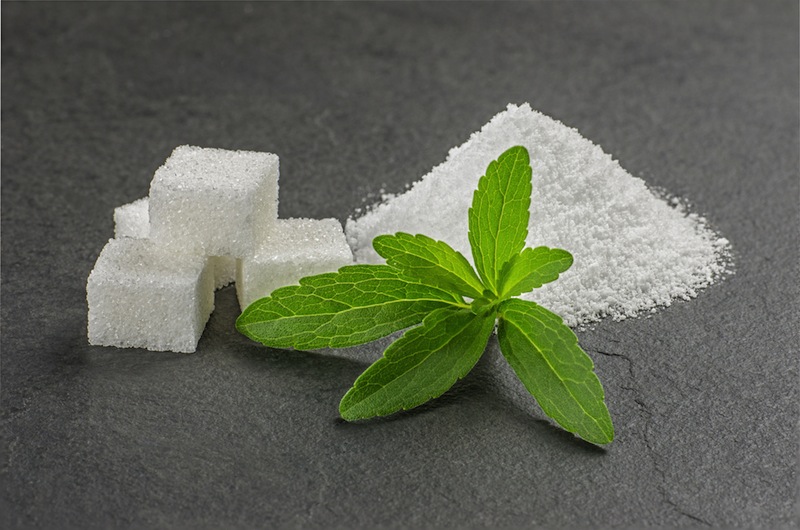How long does stevia stay in your body? Stevia is a sugar substitute that is non-nutritive or low-calorie. These chemicals were extracted and purified from Stevia leaf.

Many people make use of Stevia in place of sugar to reduce the calories they consume. This article will discuss the dangers and negative effects of the use of natural sweetness.
What exactly is Stevia?
About 200 times sweeter than sugar cane are stevia leaves. They have been used as an herb and sweetener for a long time and are also less expensive than the white sugar that is commonly used. How long does stevia stay in your body?
Risks and side effects
The FDA suggests a daily dose that is 4 milligrams (mg) per kilogram of weight to be used as stevia substitutes. This translates to approximately 12 milligrams of pure stevia extract per kilogram of body weight every day.
Experts are of the opinion that Stevia refined properly is safe and has no negative side effects, no matter if it is used to sweeten food or to enhance the flavor of food items. How long does stevia stay in your body?
Although a variety of studies have exposed possible adverse effects from Stevia over the last couple of years, the majority of them were done on lab animals. A lot of them have been disproved.
Here are a few of the potential negative adverse effects of consuming Stevia:
The kidneys are damaged
Stevia is a diuretic. Diuretics accelerate the rate of excretion by the body of electrolytes and water through urine. Since the kidney is responsible for filtering urine and producing it for the first time, scientists believed that a long-term intake of Stevia could damage the kidneys. How long does stevia stay in your body?
However, research has suggested that Stevia could help prevent kidney damage.
Certain stevia products have sugar alcohols, which can cause unpleasant reactions in people who are sensitive to chemicals.
Although hypersensitivity to sugar alcohol is not common, it may result in these symptoms:
- nausea
- vomiting
- indigestion
- cramping
- Bloating
The potential benefits to the digestion of the steviol glycosides have been proven in a number of studies that utilized cells from rodents and humans. Stevia has been suggested to ease and reduce diarrhea and Irritable IBS symptoms. (IBS). How long does stevia stay in your body?
Allergens can trigger allergic reactions.
There are very rare instances of stevia allergy discovered. The FDA as well as the European Commission found that the proportion of people allergic to Stevia or susceptible to having an allergic reaction to the product is low.
Hypoglycemia
Low blood sugar occurs as an indication that the blood sugar level is unusually low. While Stevia can assist people who suffer from diabetes to maintain their blood sugar levels, it was initially thought that prolonged or excessive use of Stevia might cause hypoglycemia or low blood sugar. How long does stevia stay in your body?
Other than those with the deficient level of blood sugar, it is very rare. Stevia can be described as a vasodilator; that is, it causes blood vessels to widen and decreases blood pressure overall. Researchers have only studied the positive aspects of this method to date.
Long-term, excessive use of any substance that intentionally lowers blood pressure may cause health problems. Patients who have high blood pressure who are persistently low should seek advice from a physician prior to taking Stevia for a long time. How long does stevia stay in your body?
The hormones are disrupted.
Steviol glycosides are a kind of steroid that can interact with hormones that are controlled by the endocrine system. Sperm cells of humans exposed to the steviol glycosides produced more progesterone, according to a study that was published in the year 2016.
Who should be avoiding Stevia?
Stevia consumption regularly may increase the chance of developing negative effects in certain people. The reason for this is the ability of Stevia to lower blood sugar and blood pressure as well as being a diuretic. How long does stevia stay in your body?
Because Stevia may interact with other medications, it is recommended to speak with a doctor prior to purchasing or drinking the product.
The chance of unfavourable reactions can be increased by the following factors:
- Medicines for high blood pressure
- Medicines for liver problems
- Treatments for kidney problems
- heart issues and treatments
- Medicine that regulates hormones
- steroids
- anticancer drugs
Stevia forms that aren’t secure
Stevia is a wide variety of stevia glycosides that are classified into five classes.
Although the majority of research is focused on two primary components in the stevia plant, sativoside and, however, there’s still an absence of evidence to justify the use of other minor refined ingredients in Stevia. In the end, FDA doesn’t consider Stevia leaves or extracts safe for consumption. How long does stevia stay in your body?
False chemicals, particularly artificial sweeteners that are linked to health risks, are becoming more prevalent in extracts of Stevia and pills. It is essential to purchasing Steviol glycoside products that are certified to contain at minimum 90% steviol glycoside, and there are no synthetic sweeteners.
These are some of the frequently used potentially hazardous substances found in the stevia product:
- maltodextrin
- saccharin sodium
- The sodium cyclamate
- aspartame
- Stevia and pregnancy
Stevia purified is typically not considered to be a health risk for pregnant women when consumed at a moderate amount. Stevia was not found to alter fertility or pregnancy outcomes in the embryos of rats and was not toxic to the fetal tissues during studies. How long does stevia stay in your body?
Certain of the commonly fake substances that are found in stevia formulations and combinations, however, are linked with serious issues and can cause congenital disorders. Saccharin is among the most widely known of these chemicals. How long does stevia stay in your body?
Stevia consumed in large amounts or for long periods of time could increase the severity of symptoms common to pregnant women by placing more stress on organs like the bladder, kidneys, and heart.
Stevia products that are used excessively during pregnancy may result in some of the complications listed below:
- overheating
- dehydration
- the blood pressure is low
- constipation
- renal dysfunction or failure
- fatigue
- headaches
- changes in mood
- nausea cramps, vomiting, and nausea
- a low blood sugar level
How can the human body use Stevia?
Within the body of the individual, all sweeteners are digested differently. When Stevia is contrasted with artificial sweeteners and other sweeteners, the distinction is often not apparent in the translation. How long does stevia stay in your body?
Let’s begin by discussing our understanding of the breakdown of sugar within the body. The pancreas releases the hormone insulin, which breaks down sugar and assists in keeping blood sugar levels under control. This is particularly problematic for diabetics due to insufficient production of insulin as well as poor sugar digestion, which results in increased glucose levels in the blood.
Stevia is metabolized in a distinct method. The body is not reacting to Stevia the same as it does with sugar, so there is no insulin produced; rather, the steviol glycosides travel through the body unnoticed (unlike sugar) all the way to the colon in which the glycoside is eliminated in stages via hydrolysis, leading to the synthesizing of Steviol. How long does stevia stay in your body?
Stevia is a component of the body that gets processed.
Steviol is transported to the liver via the bloodstream. It then combines with glucuronic acids to create Steviol and glucuronide. The steviol glucuronide is removed through urine after it has passed through the kidneys. Steviol glycosides don’t accumulate within your body. Feces and urine flush out all the food consumed by the body.
A quick analysis of Sugar aspartame (a well-known artificial sweetener) as well as Stevia
Sugar can raise glucose levels in the blood, which prompts the pancreas to produce insulin to break down sugar. Obesity, cardiovascular diseases, diabetes, hypertension, and many other diseases can result from eating too much. How long does stevia stay in your body?
Aspartame affects serotonin levels and, consequently, alters the body’s feeling of hunger. In the end, the goal of being calorie-free may be challenged. This could result in the intake of calories from different sources. According to studies, there could be several other negative impacts, such as neurotoxic and carcinogenic effects.
Stevia is not a source of accumulation in the body and has been proven to increase the production of insulin in research studies.



